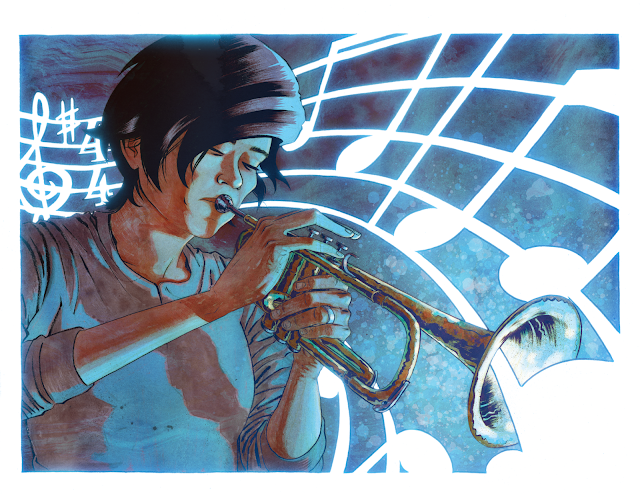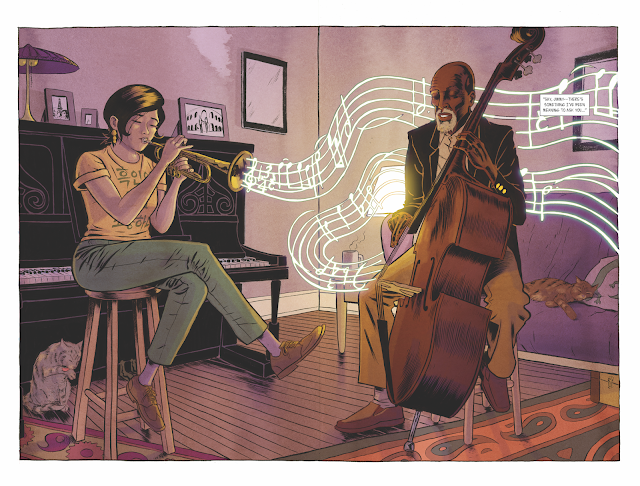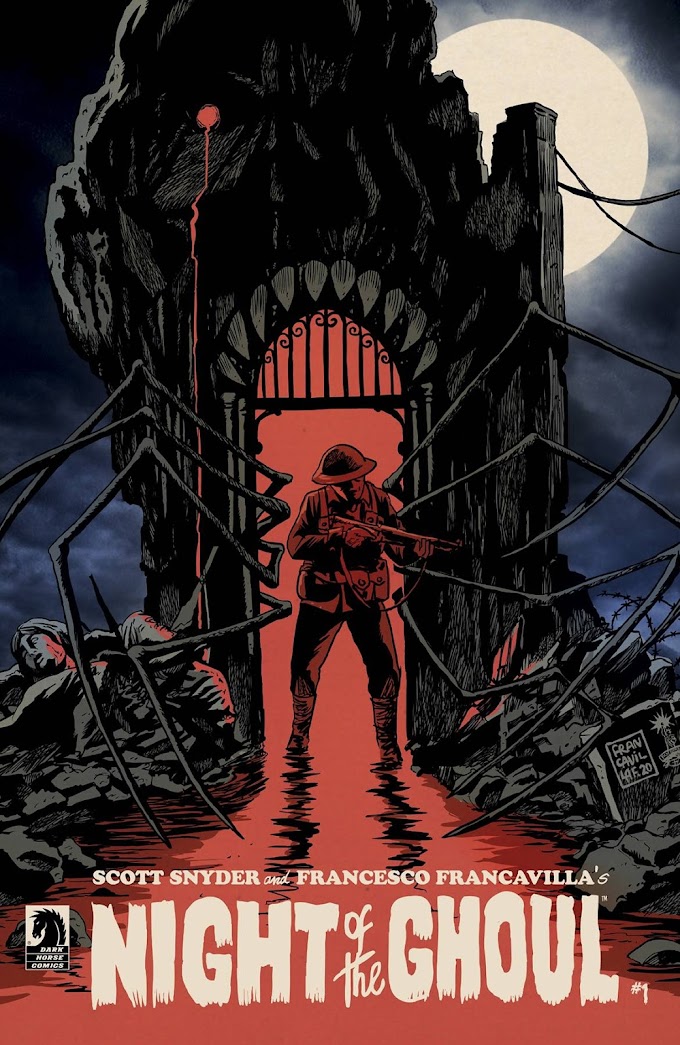
Enter The Blue by Dave Chisholm
Published by Z2 Comics
Published by Z2 Comics
Enter the Blue is a lovely, compelling read that tells a moving story and is full of drama and humor. It's also an absolute love-letter to Jazz, and more specifically, to the legendary Blue Note Records label, who has released some of the greatest Jazz music (and therefore, some of the greatest music) ever recorded. Writer-artist Dave Chisholm (Chasin' the Bird, Canopus) does wonderful work in bringing together his comic storytelling skill with his intricate knowledge of Jazz (he is a music professor and a musician). You don't have to be a Jazz fan to enjoy this story, but if you are, you'll honestly enjoy Enter the Blue at a whole other level.
First, a little history about Blue Note Records, because this label plays an important part in Enter The Blue. Blue Note Records was founded in 1939 by German immigrant Alfred Lion and Max Margulis, soon after to be joined by Lion's childhood friend Francis Wolff. They initially produced traditional Jazz records but by 1947, they embraced modern styles such as "hard bop" and other styles. Blue Note was known for treating its performers better than other labels. During its heyday, Blue Note released records from many legendary Jazz performers including Thelonious Monk, John Coltrane, Art Blakey, Lee Morgan, Cannonball Adderley, Herbie Hancock, Jimmy Smith, Wayne Shorter, and more.
Enter the Blue begins with Jessie Choi, a Jazz trumpeter in her final year as a student at a music college/conservatory. She's with her music teacher and friend Jimmy Hightower and Jimmy's wife Margot, also a teacher at the school. Jessie has serious stage fright and is experiencing serious doubts about her decision to pursue a career in music, and she's often comparing herself to another more polished student (Spain Thompson) who already has a record deal. Jimmy and Margot try to reassure Jessie regarding her choices and her love of music, but to no avail.

Sherm tells them all about the secret history of the Blue and Blue Note Records. He explains that the label's founders were very interested in Kabbalah (Jewish mysticism) and its ideas about higher spiritual planes, and they believed that you could also reach this higher spiritual plane through music. He's got a whole conspiracy-board (red string and all) set up in his apartment, and he lays out all of the hidden messaging and imagery that's included in the album titles and covers of many of Blue Note's best known albums [Note: You should absolutely go listen to all of these albums, they're all fantastic]. He also explains that these are all clues explaining how to get into the Blue and other ideas related to the Blue. Jessie is a believer; she decides that what she needs to do is get herself into the Blue and rescue Jimmy. She does this by picking up the trumpet and playing again. Jimmy is ultimately alright, thankfully. And the experience of going into the Blue forces Jessie to confront a lot of her own ideas about herself and her career and her love of music and the reasons she cast it aside. Without getting too specific, this is a story with a really moving and satisfying ending, and one that has meaningful lessons for the reader.
I really enjoyed Enter the Blue. I think Chisholm does excellent work in all aspects of storytelling. He crafts characters I care about and root for, and visually it's a really fun journey of a story. One thing I think Chisholm does particularly well is writing and drawing a comic about something auditory. It's difficult, I think, to create a comic about music and musicians.

How do you effectively convey sound (and the idea of sound) in a visual medium? Comic creators have done it with creative lettering choices, with the use of musical notes, and with the depiction of vibrations coming from a musical instrument, or a stereo, etc. There are inherent limitations in all of these techniques though, as your mind still has to make a mental leap from a picture of sound to sound itself. For my own comics consumption, I think the most effective technique is to approach this undertaking in a slightly different way. Comics can't actually convey sound. But what they can do, very effectively, is to convey to the reader what it feels like when you're listening to or performing music. Essentially, comics can approach the feeling that great music gives you via visual analogies, and effective narration and explanation.
I actually think that Chisholm does a very effective job with all of this various techniques. As the story begins and Jessie describes a performance of hers where she got stage fright, we see her shrunken, into a chaotic-looking black background. This really sells her feeling of being alone, small, and powerless in that moment. By contrast, Spain's performance is also illustrated by a black background, but it looks like some sort of energy is emanating from him, and the brightness of the sun seems to be emerging from his trumpet and the audience is transfixed. Not to mention the fact that he's also much, much larger on the page than Jessie was.
The whole concept of "the Blue" is a really fascinating one that Chisholm brings to terrific life in his illustrations. The first time that Jessie goes into the Blue, it's overwhelming. This is eight years after graduation, as she's just watched Jimmy collapse on stage and taken him to the hospital. The way in which she travels there is through fear and pain. As a concept, it seems to be connected to raw emotional honesty. Jessie is all raw emotions at this moment, like an exposed nerve. So as she's thinking about Jimmy and the events of that evening, she picks up her trumpet for the first time in years, she begins to play, and she's immediately immersed in the blue. All of her emotion and feelings about Jimmy and music and her life have brought her to this moment, and Chisholm really does a great job of showing how it's this confluence of events whereby Jessie sends herself into the Blue. It's only a moment, but we can see how she could easily get lost in that note, that moment. This is, more broadly, a great way of showing how a person can get truly immersed in what they're doing, whether it's music or anything else.
Throughout the book, Chisholm does a great job showing us Jessie's emotional journey as she makes her way into and through the Blue. There are a lot of famous faces waiting for her which is a lot of fun to see. But Chisholm also shows the seductive power and allure of the Blue. It's a moment of raw honesty, but it's also a rush for the musicians, a high. There's a danger in staying there too much and getting fixated on a particular high, whether that's a person you miss, or recapturing a particular moment.

And of those ideas, one of the key ideas is about being yourself. Yes, it's a truism and a platitude, but it continues to be incredibly good advice that has stood the test of time, in numerous different situations. I know I've been my happiest and had my best experiences when I felt like I was sharing my own personality or talking about things that really matter to me. This idea comes across in the story. Jessie is worried that she's not that good, and not capable of reaching great musical heights. Jimmy tells her Thelonious Monk said that "A genius is the one most like himself". What does it mean? We'll get to that. But what it reminded me of most was the following story that I've heard since I was a kid going to Hebrew School:
Reb [Rabbi] Zusha was laying on his deathbed surrounded by his disciples. He was crying and no one could comfort him. One student asked his Rebbe, "Why do you cry? You were almost as wise as Moses and as kind as Abraham." Reb Zusha answered, "When I pass from this world and appear before the Heavenly Tribunal, they won't ask me, 'Zusha, why weren't you as wise as Moses or as kind as Abraham,' rather, they will ask me, 'Zusha, why weren't you Zusha?' Why didn't I fulfill my potential, why didn't I follow the path that could have been mine."*
The point I think being made by both Thelonious Monk and Reb Zusha is that it's not only "better" to try to be yourself, it's the only way that a person can actually live in honesty and integrity. And it's the only way you can really produce anything original and great and "genius". God doesn't need Zusha to be Moses. There already was a Moses, and he led the Hebrews out of slavery and went up to Mount Sinai where he received the Torah from God. If you try to be Moses, you're going to fail. And if trying to be Moses is the goal of life, then all of your life is going to be a failure.
Similarly, the universe doesn't need Jessie Choi to be Louis Armstrong or Miles Davis. The goal of playing music shouldn't be fame or wealth or even to try to be "good", the goal should be to keep playing and playing until you reach a style and a sound that feels like it is your own. That is why we care about Louis Armstrong and Miles Davis - because they didn't sound like everything that came before them. They found their own sounds. And that's a lesson I think that's pretty universally applicable. If you try to live someone else's idea of what your life should be, you'll never really figure out who "you" are.
So, be yourself. But while you're being yourself, do yourself a favor and pick up a copy of Enter the Blue. It's a terrific journey.
*from rabbishimon.com




![Sweat and Soap [Ase to Sekken] by Kintetsu Yamada](https://blogger.googleusercontent.com/img/b/R29vZ2xl/AVvXsEgMnQltxjWqGS1_duhCp9Er1a0NbALuSFrqvjaV4_PjN_w67xCGghYt-l0qKyqTH7Ei7gbq_mxVq8aPAuOiyaArwAMLJWhpGmOYaARUBnwvjmv2-ZIe20m_zR5CvKnPdI6US_AuOnmi3gSX/w680/57525895-BA7E-4EF8-9FE4-89F9C164E1A4.jpeg)

